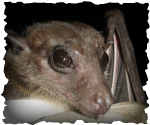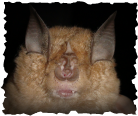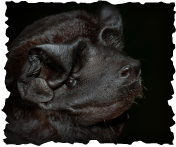Bats are one of the most diverse and successful animals in the World; with over 1300 species bats have a global distribution and are the second largest mammalian group. These unique animals have evolved over 50 million years and contribute towards pollination, seed dispersal and natural pest control. The Latin name for bats is Chiroptera meaning "hand-wing" due to their elongated finger bones which enabled them to fly.
The order of bats is split into two distinct groups:
The order of bats is split into two distinct groups:
Yinpterochiroptera
Pteropodidae (Old World Flying Foxes)

This group of bats are found throughout the Old World tropics and range in size from 20 to 1,200g. The World's largest species of bat is the Golden crowned flying fox which weighs up to 1.2kgs with a 6ft wingspan. They are all herbivores feeding on fruit, nectar, flowers, leaves and pollen and are responsible for pollinating and dispersing a wide array of plant species like mango, banana, durian and balsa. They have large eyes with very good eyesight and an acute sense of smell. One family in this order has a rudimentary form of echolocation. No bats from this group are found in Trinidad.
Rhinolophoidea (5 Old World families of insectivorous and carnivorous bats)

Recently split from micro bats and more closely related to Pteropodidae; this group is distributed throughout Asia, Africa and Europe. The two largest families in this group are the old World leaf nosed and horseshoe bats; so called because of the complex shaped structure on their nose which is used to channel their sophisticated echolocation signals. The group contains one of the smallest known bat species kitti's hog nosed bat which weighs 2g and is nicknamed the bumblebee bat due to its small size. No bats from this group are found in Trinidad.
Yangochiroptera (Micro-bats)

The largest group of bats with over 800 species and 13 families; they can be found on all continents excluding Antarctica. They all use echolocation and vary in size from 2.5g to 250g and have a varied diet including fruit, nectar, insects, fish, vertebrates and blood. The most diverse family is the Phyllostomidae with over 160 species confined to the sub tropics and tropics of the New World. Some members of this group build tents to roost in and excavate holes in termite nests others roost in millions in caves and are responsible for consuming vast quantities of insect pests. All the bats found in Trinidad are from this group.
Reference: Altringham J.D "Bats from evolution to conservation" Second edition. Oxford University press 2011.
Reference: Altringham J.D "Bats from evolution to conservation" Second edition. Oxford University press 2011.

